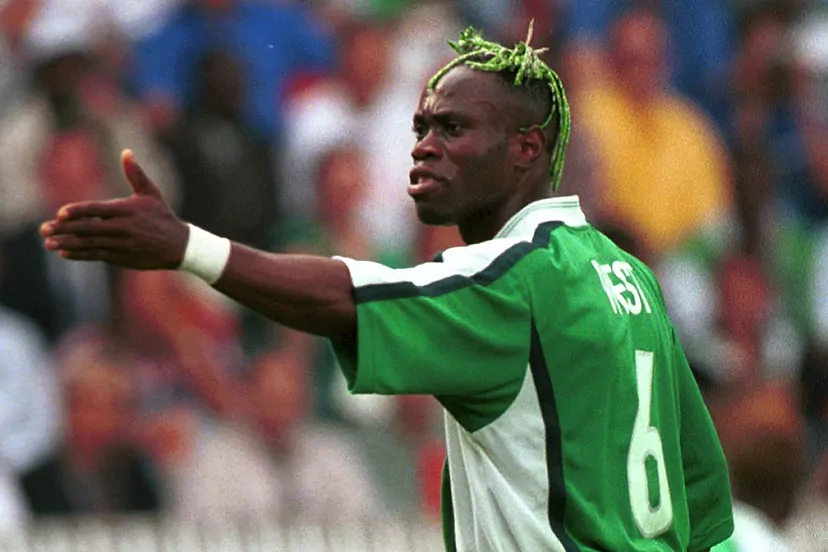By Ernest Osogbue
Taribo West, the retired Super Eagles defender, has been in the news recently over his complaints at the burial of his former teammate Peter Rufia. West had raised his voice over the amount of care offered to retired sportsmen in Nigeria. According to him, persons whose names are branded as national heroes should receive more care than was given to Peter Rufia. Different opinions have been expressed over West’s position. Some have come to his defense, while others have disagreed with him. In my opinion, however, West was only expressing a view held by many Nigerians. Across the nation, there is a perception that Nigeria owes a duty of life-long care to anyone who has been on national service.
Not too long ago in Abuja, retired police officers blocked the entrance to the police force headquarters in protest over their pensions. Also, retired military officers blocked the entrance to the federal ministry of finance, disrupting traffic in the process, over what they termed a delay in accessing their pensions. Over time, Nigeria has witnessed sporadic protests from senior citizens over post-service care. Retired public and civil servants grumble about their entitlements. Either it is delayed or incomplete, or it is not enough. This has been the trend in Nigeria, so we should not single out Taribo West for undue criticisms.
From all indications, Nigerians do not study the terms of engagement before going into any employment. We are like a priest who, after taking a vow of celibacy and promising to shun materialism, suddenly begins to admire beautiful women and to covet riches and material possessions. Our people accept a job, work for 35 years, collect their salaries and emoluments, then retire and start complaining about their pensions. What can you achieve with pension that you did not achieve with 35 years of collecting salaries and emoluments? It is about time we understand that the best pension plan is the one you put in place by yourself. This means that you must plan for retirement from the first day of employment.
From observations, three issues could be responsible for the recent upsurge in the demand for post-service care by many Nigerians. First, the pension reform act 2004. This act stipulates a contributary scheme, where the employer and the employee pool resources together on behalf of the employee in anticipation of retirement. Over the years, this system has been found wanting, especially with regards to lower cadre staff, whose salaries are so poor that the cumulative deduction at retirement is nothing to write home about. The recent viral video of a retired police officer lamenting the small amount of his pension is a good example.
Secondly, there is an acute lack of understanding of what employment means by many Nigerians. Employment is only for a period of time. After retirement, you are to take care of yourself. In the case of the civil cervice, it is 35 years of service or at the attainment of 60 years of age. It is your responsibility to plan and prepare on how you are to live after retirement. As an employee, you must develop yourself, invest in different areas, and, if possible, create other streams of income in preparation for retirement. It is not the duty of your employer to take care of you after retirement. The pension you receive is only supplementary and should not be your all and all.
Thirdly, the impact of politics. Politicians have taken advantage of their positions to look after themselves. State governors are signing off on multi-billion Naira pensions. National assembly members fix their own salaries and allowances, with other political office holders enjoying one perk or the other. Civil servants and others who also served Nigeria in different capacities believe that their services should be appreciated more via an increased pension and post-service care. Nigerians become angry and unhappy when they see politicians living large at the expense of the people. Legislators pampered themselves with cars worth millions of Naira at the beginning of the tenure of the current administration. While the high cost of living wiped out the income of citizens. These are some of the reasons why there has been an upsurge in the disaffection concerning pensions and post-service care to many Nigerians.
On retirement, many suddenly realize that their youthful days are gone and that they are no longer employable. Most people have very little to show for the years of service, and a sense of hopelessness sets in. They become angry at society and therefore target their previous employer, which in most cases is the government. In more advanced societies, in-service training, which equips staff with marketable skills, is usually undertaken. Also, staff are encouraged to improve themselves through educational opportunities, skills acquisition, and general improvement of their knowledge. This keeps the staff relevant and employable, even after retirement. For our footballers and sportsmen, financial literacy programs could be arranged for them to ensure that they make smart investments with the monies they earn. Another problem is that people no longer accept their calling and the sacrifices required of them. Soldiers sign up to die for their country. Policemen, firefighters, caregivers, and others die in the service of the nation. Ordinarily, their services should not be about money but about duty and honor. Today, however, everyone wants to live large and to be a millionaire. How much was Dr. Ameyo Adadevoh, who put her life on the line to protect Nigerians paid? Service to the nation should be a thing of pride. A point that should also be noted by politicians.
Unfortunately, however, politicians have set a bad example, and everyone wants to be like them. We forget that all jobs do not pay in the same way. As a sports reporter, I did a survey recently, comparing the remunerations of sportsmen in different fields. An athlete receives US$50,000 for winning the diamond league. This is for a competition that runs for several months. Similarly, a tennis player receives US$4.1m for winning the Wimbledon tennis championship. An event played over a 14-day period. On the other hand, a cyclist who wins the Tour de’France receives less than US$600,000. This is for an event that involves riding a bicycle for about 4000 km over 21 days. Climbing high mountains, descending steep hills at over 250km per hour. Boxers earn mega-millions for a fight that lasts not more than 36 minutes. Golfers earn even more. Volleyballers, handballers, weightlifters, and many others earn very little comparatively.
Despite these disparities in pay, everyone is proud of their own sport and is contented with what they earn. In Nigeria, however, this is not so. A driver wants to earn like the chairman. A bricklayer wants to live like the landlord. A househelp wishes to displace the wife and take over the home. There is so much greed and jealousy leading to large-scale discontentment. We are always looking over our shoulders at what the other person earns. Journalists complain about what politicians earn and, therefore, write negative stories about them. Sports reporters are jealous of sports administrators over estacode and therefore blackmail them with false reports. Soon, referees will start giving red cards to footballers simply for earning more money.
I sometimes wonder why people do not change jobs or professions if they are dissatisfied with their earnings. For instance, how could a priest be jealous of Aliko Dangote who is a businessman? But that is what happens in Nigeria. Soldiers are jealous of footballers, civil servants complain about the presidential jet, traditional healers are jealous of pastors, an Okada rider hates car owners, and the cycle goes on. People have forgotten the essence of their calling. It behooves every individual to understand the value of their profession and the financial limitations inherent in their services.
This is where the Taribo West rant comes into play. Footballers collect camp allowances, they receive win bonuses, and are feted while in the national camp. Rewards and awards are given to them when they excel. They equally get handsomely paid at their parent clubs. Nigeria can not continue to foot their bills after retirement. In the end, not only sportsmen, but all of us must learn to accept the challenges of our different callings and the limitations of our earnings. Nigeria does not owe any citizen post-service care except to the extent of paying off all accrued benefits.
If you wish to earn like the politicians, resign and contest elections. If you are jealous of any profession, nothing stops you from switching to that profession. If not, shut up, accept your fate, and focus on your calling. All fingers are not equal. Let us learn to be contented with what we earn and stop looking over the fence at what the Joneses are eating.









